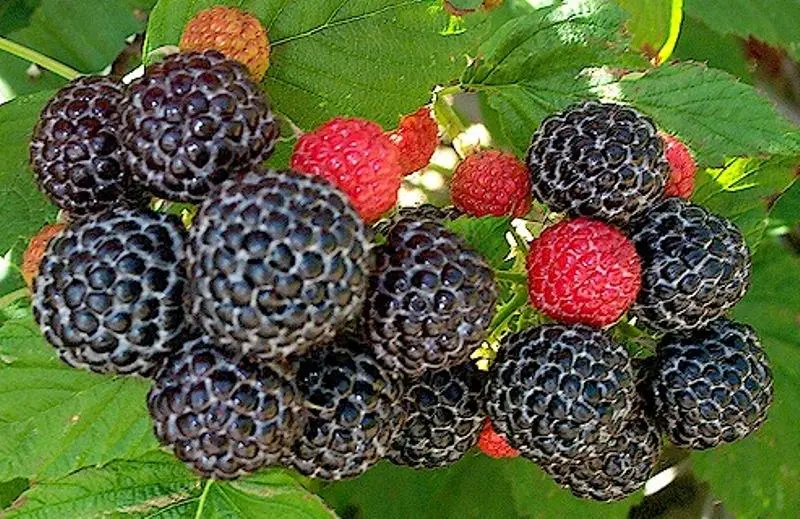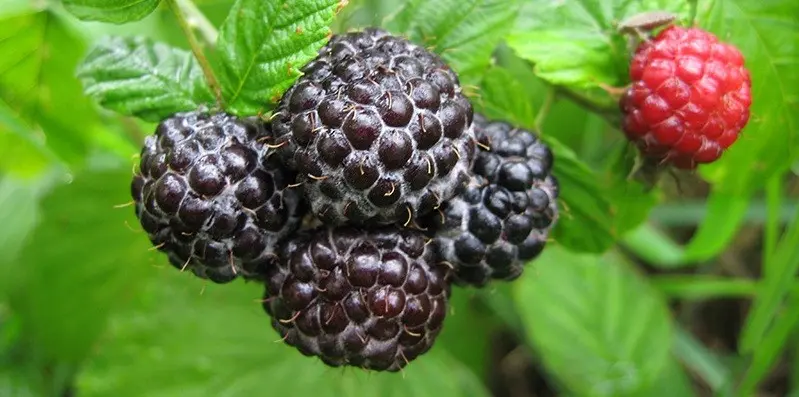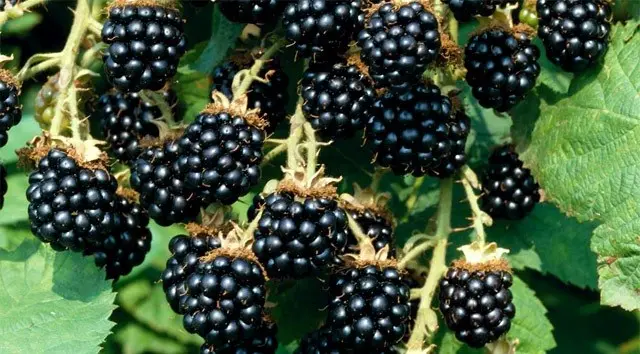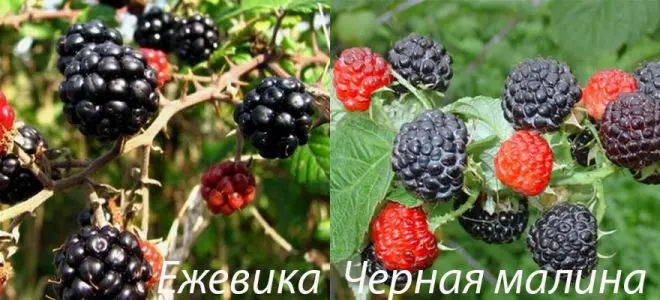Contents


Black raspberries have recently appeared in our gardens, but thanks to their excellent sweet taste and delicious aroma, gardeners and berry lovers quickly fell in love with them. The black raspberry bush has long curved lashes, and the berries are black with a bluish bloom, which is why the culture is often confused with blackberries. Black raspberries and blackberries at first glance are indeed very similar, but if you look closely, you can find many differences. How to distinguish unusual raspberries from blackberries is described in the article.
Characteristics of black raspberry
Black, or blackberry-like raspberry is a perennial shrub with a two-year vegetation cycle – shoots grow in the first year, and begin to bear fruit in the second. Annual shoots are thin, branched, covered with a bluish bloom, with tops hanging down. Biennial – stiff, brownish, with an intense bluish or purple bloom, covered with small spines. Flower buds form on them, and then racemose inflorescences.
The root system is deep and highly developed. Unlike varieties with red berries, it does not give basal shoots, therefore it propagates by layering and rooting of the tops. The bush is compact, the lashes are long (2-3 m), arched, require pruning.
The berries are complex drupes of medium size, round in shape, black in full ripeness, with a bluish bloom and light hairiness. They are easily separated from the receptacle, but they do not crumble and are stored for a long time without losing density. The taste is dessert sweet (sweeter than red raspberries), without acid.
Most varieties have high immunity to cold – they can withstand temperatures of -20-25 ° C, but it is better to cover for the winter. Plants are not demanding to care, unlike varieties with red berries, are not susceptible to diseases, and are practically not damaged by pests. The yield is high – 2-4 kg per bush, but depends on the variety. The fruits are dense, well transported, amenable to any processing.
Video “All about black raspberries”
In this video, an experienced gardener will talk about raspberries.
Characteristics of blackberries
Garden blackberry is a perennial shrub with a two-year vegetation cycle, or annual (remontant varieties). Depending on the length of the shoots, several forms of culture are distinguished: erect, creeping and semi-creeping. The shoots are flexible, long, depending on the variety, they can reach from 2,5-10 m in height, therefore they require pruning and installation of supports (trellis). Most varieties have thorny lashes, but there are hybrids without thorns (Lochness, Thornfree).
Berries are multi-component drupes of round or oblong shape. The size and weight of the berries depend on the variety (from 3 to 10 g), but there are garden hybrids weighing up to 20 g. The surface of the berries is often glossy or with a bluish bloom. The berry tastes sourer than raspberries, besides, it has a slight astringency, but there are hybrids of a very sweet, dessert taste. Most varieties have a very dense texture, so they are perfectly transported and have a good presentation.
The winter hardiness of the culture is low – most varieties freeze already at a temperature of -15 ° C. Productivity is high – some foreign hybrids are capable of producing up to 20 kg of berries from one bush. Of the advantages of the culture, high adaptation to diseases and pests, resistance to drought can be noted. Plants are not very demanding for care, however, annual autumn pruning is a prerequisite for good fruiting and high yields.
Video “All about blackberries”
In this video you will see a complete overview of culture, down to the smallest detail.
Differences
You can write a lot about the differences in agricultural technology and commercial characteristics of both berries, but it is much more interesting for a simple layman to know and determine how blackberries differ from black raspberries in appearance, and what signs indicate one or another species.
If you look at the plants during the fruiting period, the difference is almost imperceptible – a lush bush with bending lashes, all strewn with small white flowers and red, as well as black berries. Blackberries and raspberries are red in color at the beginning of ripening, and only in full ripeness turn black.
Therefore, how to distinguish raspberries from blackberries and where which berry is, can be understood upon closer examination by the following features:
- berry shape – raspberries are more rounded, hemispherical in shape, and garden blackberries have an oblong shape, like red raspberries;
- detachment of the receptacle – when removed from the bush, the receptacle remains from the raspberry (the inside of the berry is hollow), while the blackberry is torn off along with the stalk;
- different ripening period – raspberries ripen a couple of weeks earlier, as it is more cold-resistant and begins to bloom a little earlier, however, with some early varieties of blackberries, the fruiting time may coincide;
- the appearance of the stems – the blackberry shoots are green with strong, sometimes black spikes, while the raspberry spines are small and thin, and the shoots are lighter, with a bluish or bluish bloom;
- the shape of the bush – the blackberry bush is dense and more thickened, the raspberry grows more freely and its branches are shorter.
Compared to red raspberries, chokeberry varieties are more productive, but if black raspberries are compared with blackberries, then the latter is superior in yield to raspberries. It can also be noted that blackberries tolerate drought better, and raspberries can wither from lack of moisture. Blackberry is more thermophilic, needs shelter for the winter, but is less demanding on the composition of the soil. As you can see, cultures can differ not only in appearance, but also in care requirements, but nevertheless, both black berries are in great demand in horticulture and are a valuable food product.
Author: Svetlana Galitsina
Loading…









